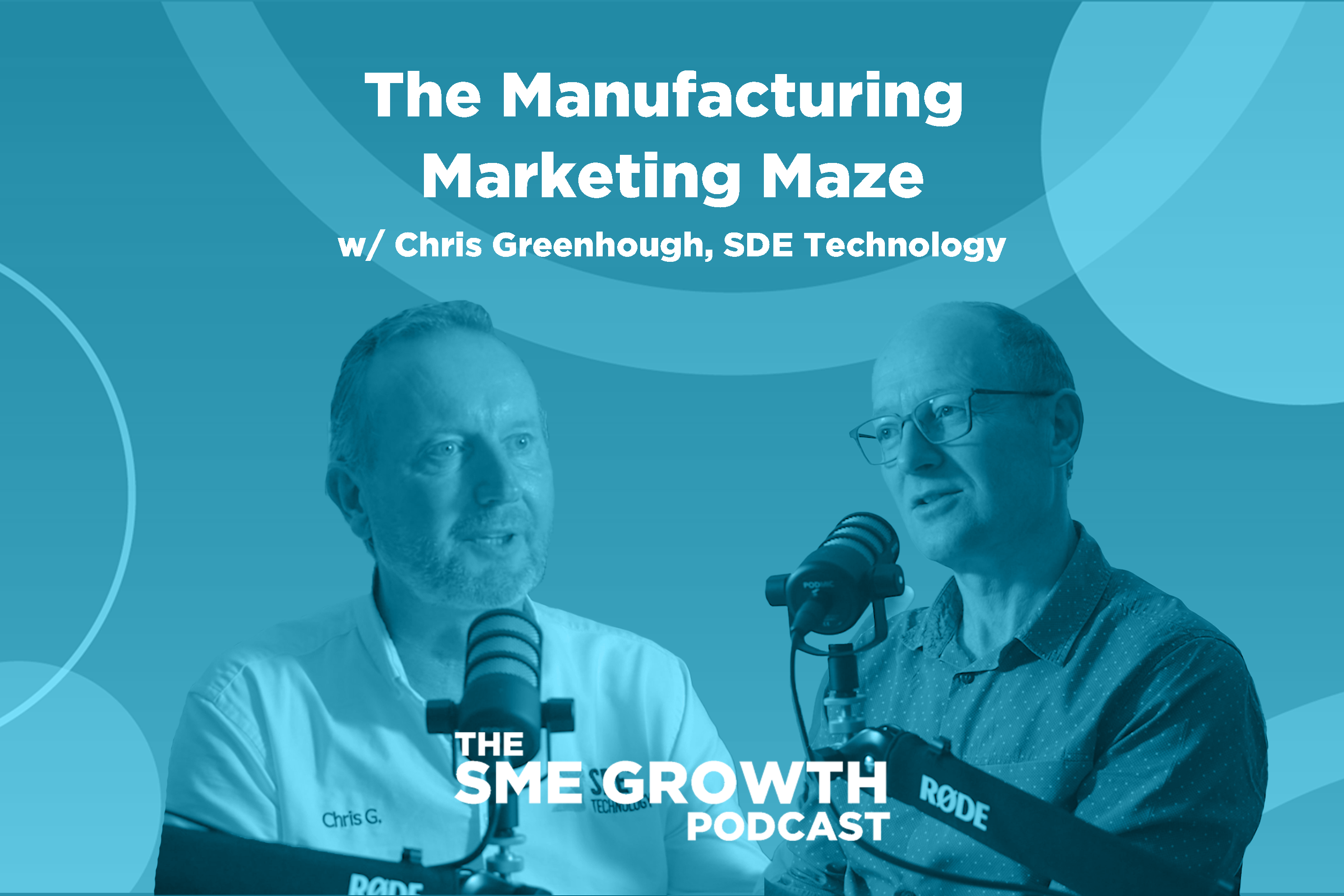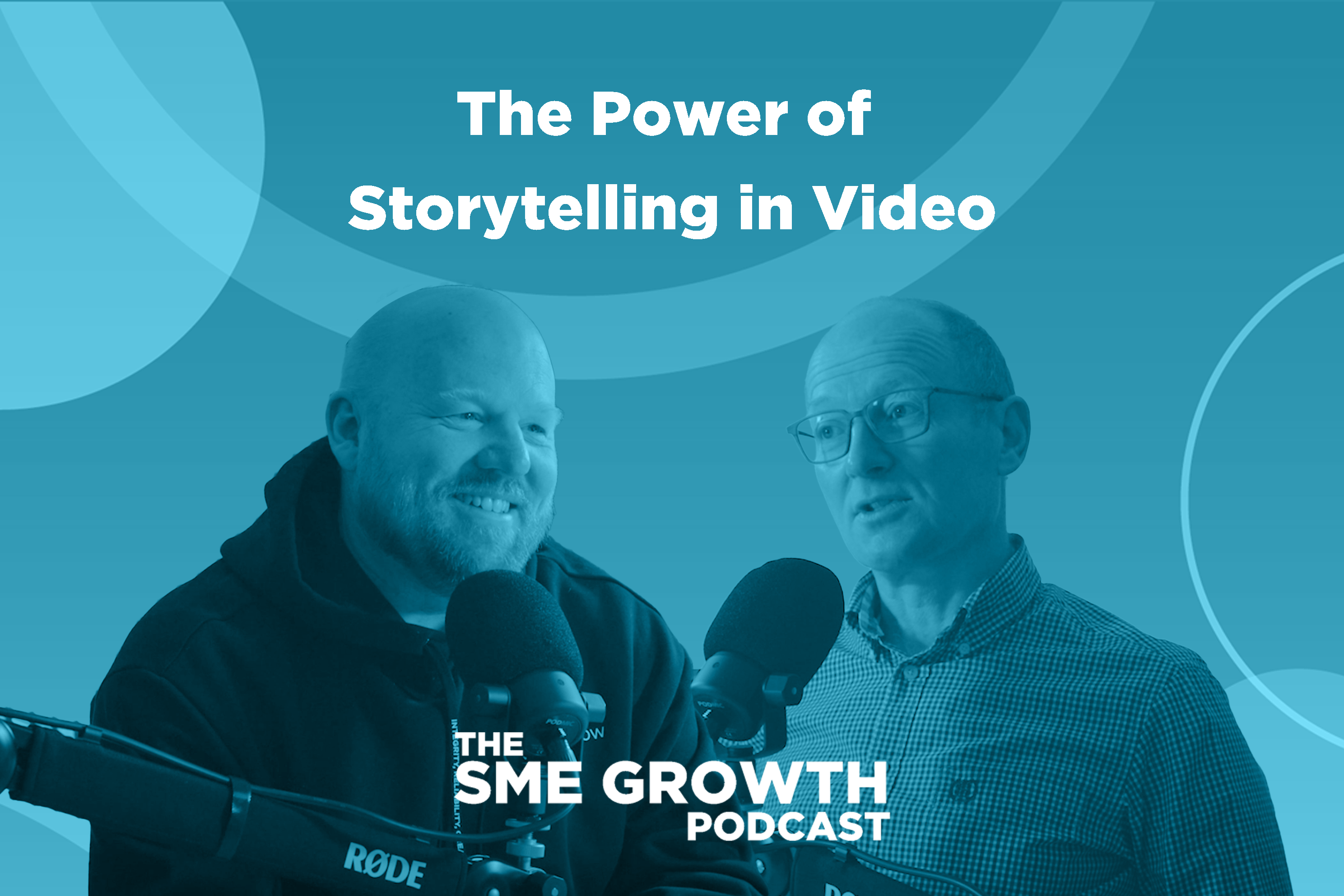Episode 43: What is the Role of Exhibitions for Marketing?
With $14 billion dollars spent annually on exhibitions globally, they can be a powerful addition to a company's marketing strategy. But how do you...
Wellmeadow supports ambitious companies with business growth enabled by HubSpot.
We've worked with over 100+ businesses at board-level across sectors such as automotive, manufacturing, healthcare, legal, SaaS, and professional services.

%20(A4).png?width=71&height=100&name=portrait%206-box%20model%20diagram%20(1170%20x%207051%20px)%20(A4).png)

-1.png?width=70&height=70&name=Square%20(1)-1.png)

In the ever-evolving landscape of small and medium-sized enterprises (SMEs), marketing is a formidable challenge, particularly for those in the manufacturing sector. In this episode of our SME Growth Podcast, we sit down with host Dave Parry and special guest Chris Greenhough from SDE Technology, to unravel the intricate challenges that manufacturers face in the realm of marketing.
We also explore the potential of podcasts as a marketing tool for manufacturers.
You can listen to the full episode here.
Marketing in the manufacturing industry is complex, as it involves not only promoting the business but also explaining the intricate processes involved in manufacturing the specific product to a largely uninformed audience. Convincing potential customers about the company's ethos and capabilities is essential.
Manufacturers are not traditionally associated with strong marketing capabilities; often following a pattern of initial investment in a new website and social media presence, only to neglect them later, resulting in outdated online profiles.
To thrive in the evolving landscape, manufacturers must adapt to changing market dynamics, especially the increasing reliance on online research and networking. Establishing a robust online presence, particularly on platforms like LinkedIn, is crucial to connect with potential customers who may not engage in traditional face-to-face meetings.
Indeed, statistics reveal that a significant portion of buying decisions now begins and often concludes online, underlining the importance of a strong online marketing strategy for manufacturers.
Marketing strategy for manufacturers can be particularly challenging due to the inherent complexity of their products. Unlike consumer goods, manufacturers often deal in B2B transactions, introducing a unique set of challenges.
Manufacturers must not only convey the technical nuances of their products, but also navigate the complexities of their business processes and differentiation from their competitors.
To mitigate these challenges, successful manufacturing marketing involves not only highlighting the technical aspects but also emphasising the business benefits, commercial advantages, and reliability.
In addition, it requires a continuous effort to maintain a strong market presence and adapt to the constant turnover of buyers, even within the same companies. Building trust and consistently proving superiority in quality, timeliness, and pricing is a delicate balancing act for manufacturers in their marketing strategy.
‘I call it marketing selling because buyers move on so quickly. You have to convince somebody new you’re the right supplier, you can make it on time and the quality is right’.
Chris Greenhough, SDE Technology
Manufacturing marketing faces a unique challenge when dealing with diverse audiences at various stages of the buyer's journey. Unlike a linear progression through awareness, consideration, and decision, manufacturers often encounter multiple individuals within a firm, each at different points in their journey. This means some potential customers may be at the early awareness stage, while others are evaluating specific features or comparing options.
Effectively addressing this challenge requires a multifaceted marketing approach that caters to both existing buyers, showcasing new capabilities and competitive advantages, and newcomers, providing fundamental information about products and innovations. In this dynamic landscape, continuous and varied content creation is essential to engage and inform the diverse audience within manufacturing firms.
Manufacturers also face the challenge of creating and adapting content for marketing which caters to diverse departments and individuals within target companies. This involves considering the needs of various stakeholders, including finance, HR and engineering departments. While the primary content may be focussed on the core business and its technical aspects, there’s a growing recognition of the value in creating content such as buyer's guides, to help non-technical personnel understand and promote the products or solutions internally.
For manufacturing marketers, the challenge lies in finding the right balance between technical depth and simplicity, ensuring that the content aligns with the specific needs of different audience segments within complex B2B environments.
Many manufacturers tend to stick to their established marketing approaches, often pitching to the same customers in the same way. However, the challenge lies in striking the right balance between selling something new to existing customers and expanding to new markets with innovative products. While manufacturers may have a stable customer base with repeat orders, this often translates into a focus on customer management rather than aggressive growth strategies.
Innovation in marketing and adapting to changing environments, such as leveraging social media platforms like LinkedIn and Twitter, becomes essential when introducing new products or services. These shifts necessitate a proactive approach and constant communication to reach new buyers quickly. Dynamic and innovative marketing strategies are essential for manufacturers to stay competitive, and create new opportunities in an often changing business environment.
For manufacturers, identifying the right audience is vital when it comes to marketing. Unlike B2C companies that can often use mass broadcasting channels effectively, manufacturers must be more selective in their approach. This is due to the specific, often niche, nature of their products and services, making it essential to choose the most effective channels for reaching potential customers.
LinkedIn, for example, is a social networking platform commonly used by professionals, but even there only a small portion of the audience may be interested in the intricate details of a specific manufacturing process. For manufacturers, networking connections are about quality, not quantity. Building a network of relevant contacts is important, and this includes both existing customers and potential clients. A successful marketing strategy involves nurturing these connections over time through consistently delivering valuable content.
It's important for manufacturers to build a rapport from marketing in a planned, appropriate way. While showing a personal side, or sharing personal interests can help build connection, it’s essential to strike a balance between personal and professional content, ensuring that it aligns with the interests and preferences of the target audience.
Finally, consistency and relevance are key in content creation and delivery when it comes to creating an effective marketing strategy for manufacturers.
Long sales cycles in manufacturing are an additional marketing challenge. In manufacturing, sales cycles can be exceptionally long compared to other industries or B2C. While typical consumer purchases may take a month or two to decide, manufacturing sales can take years, especially when dealing with production lines or complex projects requiring significant investment like automotive manufacturing.
This long sales cycles post difficulties for manufacturers, particularly because marketing doesn’t offer instant feedback. Manufacturing marketing may take months, or even years to pay back. Consequently, during difficult economic periods, manufacturers often consider cutting back on marketing budgets. However, this can lead to stagnation and losing ground to competitors.
Marketing can have a flywheel effect, with long-lasting benefits even after marketing efforts have ceased. Evergreen content, good SEO, and high-quality content can continue to attract leads and customers long after the initial marketing campaign.
Marketing for manufacturers can offer a distinct mix of challenges, and this requires a strong multi-channel marketing mix. As we’ve discussed, a successful marketing strategy involves nurturing connections over time through adding value and interest consistently.
Incorporating podcasting into the marketing mix for manufacturing businesses offers companies a unique avenue to build personal connections with customers and peers. Creating and publishing a podcast allows manufacturers to address industry-specific challenges, demonstrate expertise and navigate market complexities; all while engaging with current and potential clients in their network.
A podcast supports a strong marketing strategy, but it also positions the business as a trusted authority in the manufacturing sector, delivering nationwide reach and fostering brand awareness across the sector (and beyond).
By leveraging the power of podcasting, manufacturing companies can effectively market their business while offering value-added insights to their audience and industry peers.
Marketing in the manufacturing industry presents multifaceted challenges for businesses, and this demands innovation and adaptability. By addressing these challenges proactively and adapting to the evolving marketing landscape, manufacturers can position themselves for success in an increasingly competitive and digitally-driven environment.
Manufacturers must invest in consistent online engagement through various channels, particularly as the buying journey primarily begins and ends online. Diversifying marketing strategies, addressing complacency and effectively targeting diverse audiences at various stages of the purchase cycle are vital. Podcasting is a valuable tool for manufacturers to add value and create connection in an increasingly competitive world.
Spotify:
Apple Podcast: https://podcasts.apple.com/us/podcast/episode-42-the-manufacturing-marketing-maze-w-chris/id1654715808?i=1000631110312
For all other platforms: https://podcasters.spotify.com/pod/show/wellmeadow

With $14 billion dollars spent annually on exhibitions globally, they can be a powerful addition to a company's marketing strategy. But how do you...

In this episode of the SME Growth Podcast, hosts Dave Parry and Richard Buckle discuss the latest UK business news and how this impacts SMEs, share...

Are you an entrepreneur or a small business owner dealing with the challenges of having one dominant customer? On this week's episode of The SME...